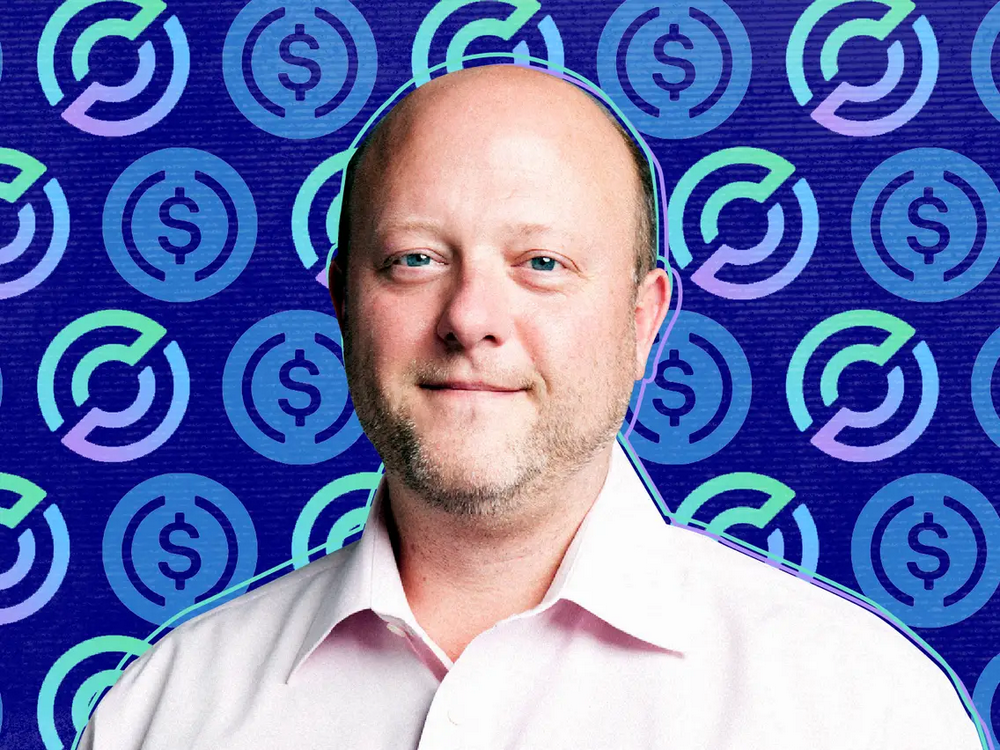Following the Telegram, we believe that the SEC will start with these two projects.
On October 15th, CNBC cryptocurrency commentator Ran NeuNer tweeted that the private investor of the Telegram Open Network (TON) developed by the Telegram team of encrypted chat tools has been informed and asked for TW token extensions. Also issued, in addition, he also revealed that the team is trying to reach an agreement with the SEC.
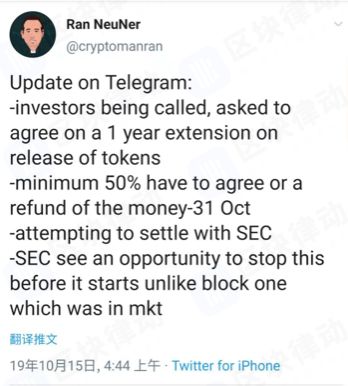
According to the news that BlockBeats learned from the block, the TON team has indeed started to contact private investors. The investors have introduced the SEC-related people to TON, hoping that the two parties can reconcile.
The SEC has recently communicated with well-known projects such as EOS and Siacoin on the grounds of “unregistered securities”, and they all chose to pay a fine to reach a settlement with the regulator.
- Libra has become a catalyst for the reform of the mothers? The central bank governor told the reality
- Getting started with blockchain | Block heights and bookkeeping
- Howe Test: SEC hangs the sword of Damocles on the head of the encryption company
But the status of TON is different from EOS and Siacoin: on the one hand, TON's token Gram does not flow into the market; on the other hand, the founder of Telegram is not a habitual and regulatory reconciliation.
From confrontation to reconciliation
In the eyes of the Russians, Telegram's founder, Pavel Durov, is "Russian Mark Zuckerberg."
In 2006, before the creation of Telegram, Paul emulated Facebook at the university and developed a Russian social platform VK, which was very popular. At that time in Russia, the Internet was not fully watched by the regulatory authorities. The fission effect of VK spread rapidly in Russia, and soon surpassed all social competing products, becoming the main venue for Russians to speak freely.
But with the development of the Internet, the government is aware of the importance of regulation. The Russian government asked Paul to give the government a channel to view the chats of all users. Paul refused directly.
This practice angered the Russian government. Under various pressures, Paul was forced to sell his shares to leave the VK, took the money he had exchanged, and made another social tool, Telegram.
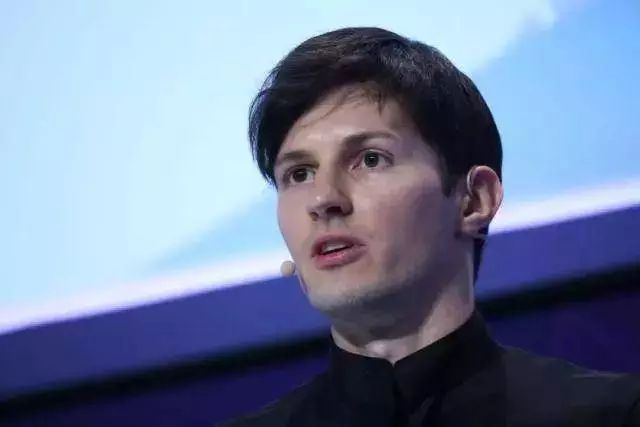
Unlike other chat tools, Telegram is a completely private and encrypted chat tool. Simply put, if there is no key, it is impossible for outside people to find the chat content in the Telegram. With this selling point, Telegram once again swept Russia, harvesting 200 million users in less than a year.
But Russia once again found Paul, for security reasons, and asked him to provide access to the content of the chat within Telegram. Paul refused again.
This time, the Russian government did not delay the time and directly took Telegram to court. The court ended in less than 10 minutes. Russia announced the national ban on Telegram. Immediately afterwards, the IP address of Telegram was blocked. Within a few days, tens of millions of IP addresses were blocked. Even Putin himself used Telegram, and he had to transfer to other chat tools.
But even then, Paul still has no choice to reconcile with the government.
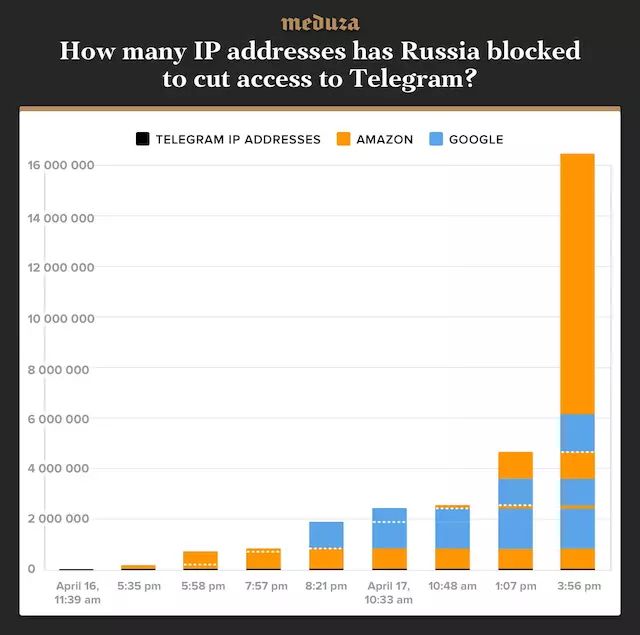
Russian government blockade IP growth (figure / Meduza)
With two entrepreneurial experiences and a tit-for-tat with the Russian government, Paul has won the support of many Russian people. Therefore, when he said that he would like to privately raise the Telegram Open Network, less than 200 private investors would have reached $1.7 billion, making it the largest cryptocurrency project at the time.
But this time, the founder who has repeatedly confronted Russia, this time seems to compromise with the US SEC.
Being "pointed" by the US SEC
On October 12, the SEC announced that it would ban tokens from being issued in the United States and sued the TON team. Faced with the regulatory layer again, the TON team is no longer as tough as it used to be.
According to block block rhythm, BlockBeats has learned that TON has contacted private equity investors to ask if they can accept the Gram token extension for one year. Private investors are also introducing the SEC team to the TON team and hope that both parties can properly resolve them.
There are not many time left for TON. According to the rules, the TON team needs to issue tokens before October 31, otherwise a refund will be issued. Private investors also said that the worst case scenario is that the SEC does not want to properly resolve it with TON, TON is not willing to refund, and the cost of filing a lawsuit against TON is very expensive, so it can only be used as a sunk cost.
But in this case, the personal reputation of the TON team, or Paul Dulov, will be a huge blow.
Three days ago, the SEC announced that it had initiated a temporary restraining order for Telegram Group, which issued unregistered digital tokens in the US and overseas, and its wholly-owned subsidiary TON Issuer.
According to SEC's complaint, the TON Network began raising funds in January 2018, which sold about 2.9 billion Gram tokens to 171 initial buyers worldwide at a private discounted price, including about 10 sold to 39 US investors. Billion Gram. According to the SEC, the TON project team did not follow the registration of the Gram token as a related offer for securities under the Securities Act, and lacked the necessary disclosures regarding the operation, financial situation and risk factors of the project team. Steven Peikin, co-director of the SEC's law enforcement department, said: "We have repeatedly stated that issuers cannot evade federal securities laws simply by calling themselves "cryptocurrencies."
Although the relationship between the TON project and Telegram is well known, since the launch of the former, Telegram has not been publicly known as the TON platform for a long time, until a week ago.
In early October this year, Telegram first publicly stated its relationship with the TON network and published the terms of service for TON and GRAM on its official website. As stated in the Terms of Service: "We are unable to control the TON blockchain network, so there is no guarantee that any transaction details submitted by the service will be verified and confirmed on the TON blockchain."
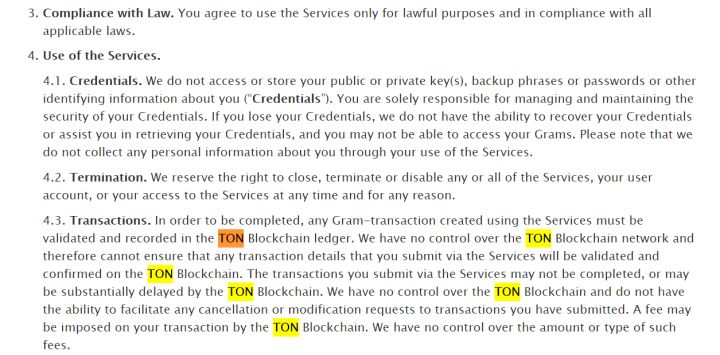
Screenshot source: https://telegram.org/tos/wallet
In addition, the terms also mention that the company will "have no ability to make any cancellation or modification requests for transactions submitted by users." Previously, TON had stated that he would not be responsible for any node operations and would not have any active hot start plans.
Despite raising $1.7 billion at the beginning of 2018, Telegram has been “hidden and not sent”, and the entire TON team has been working on closed development, and there is no deeper and detailed understanding of the project and the team.
In mid-September this year, Eitafang founder Vitalik Buterin commented on TON in an interview. He thought that "(TON) is definitely worthy of attention. But at the same time another important thing is that the blockchain can do in these areas. What, still have to be realistic."
In reality, TON is still eyeing the US SEC.
Next target"?
As Ran said, because EOS is already on the market, the SEC can only fine, but this time, the SEC saw an opportunity to stop the token in advance when the token has not yet entered the market.
So who is the next project?
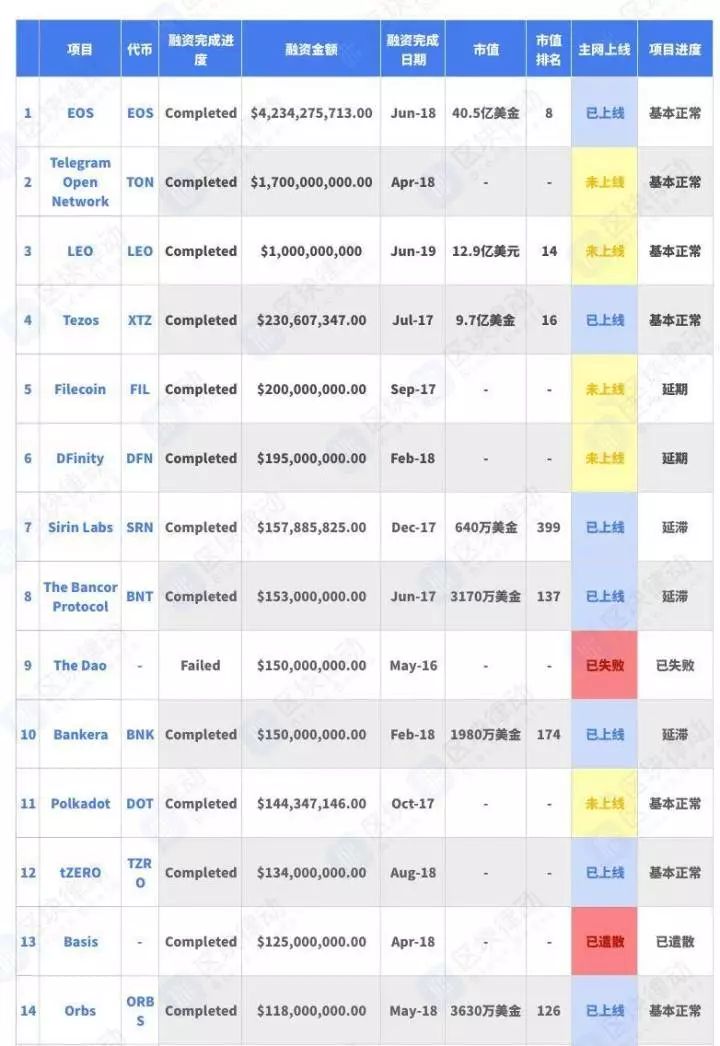
Image Source: Block Rhythm BlockBeats August 8 article
BlockBeats has counted the top 50 items with the highest amount of token financing in history. TON, which ranks second in the history of financing, has been targeted. The next project with huge financing amount and no tokens is Filecoin and DFinity, very likely, one of these two projects will become the next target of the SEC.
Filecoin was famous in the past, just like EOS in 2018. Filecoin was the first "blockchain 3.0" before EOS. The blockchain network, based on the IPFS protocol, which can be said to be able to subvert the HTTP protocol, conducted ICO crowdfunding after receiving a total of $52 million in angel financing from top investment institutions such as Sequoia Capital and USV in August 2017. Raised funds of 200 million US dollars. This was ranked second in financing history at the time, second only to Tezos. The progress of Filecoin's main network has been delayed.
From the planned June 2018 launch time to February this year, and then to the third quarter, and then to March next year, Filecoin's main network has been postponed 4 times, investors have not received FIL tokens. .
Dfinity (DFN) is also a well-known project dedicated to creating an infinite expansion supercomputer that can be used by people around the world. Even V God has rated Dfinity as the most powerful potential competitor in Ethereum. In August 2018, Dfinity completed $195 million in financing, and top investment institutions such as Polychain Capital and Multicoin Capital were involved in the investment.
However, Dfinity also encountered problems in the development progress. The original network of the first half of this year was also postponed until the second half of the year, and may even be postponed again.
Due to development schedule issues, FIL and DFN are currently not in the market, which is in line with the SEC's "user portrait". The relationship between the Telegram Open Network and the SEC and the way it is handled may become the experience of Filecoin and Dfinity.
"Compliance" seems to be a hot spot this year, with SEC approval from Blockstack and YouNow, token sales under Reg A+ rules, and fines for unregistered projects at the SEC. Non-compliant projects were fined by the SEC and even prosecuted.
Just like Blockset's co-founder and CEO Muneeb Ali commented after TON was banned and sued, "This is why we have to follow the path of compliance."
We will continue to update Blocking; if you have any questions or suggestions, please contact us!
Was this article helpful?
93 out of 132 found this helpful
Related articles
- CME Group Q3 Report: Bitcoin futures grew 61% year-on-year despite the market volatility
- Two times to prevent the ASIC from failing, Monroe will completely change the algorithm at the end of October.
- Members of the Libra Association are sure! But there is no Facebook on the list?
- Libra's five board members were freshly released, and a16z said that its initial intentions have not changed.
- QKL123 Quote Analysis | Bitstamp is now a large transfer, is a managed transfer BitGo? (1015)
- Observation | The total amount of USDT in Ethereum is close to the Bitcoin network, and the revenue of Bitcoin miners exceeds US$15 billion.
- The blockchain national team is here! National Information Center and UnionPay jointly released blockchain service network



